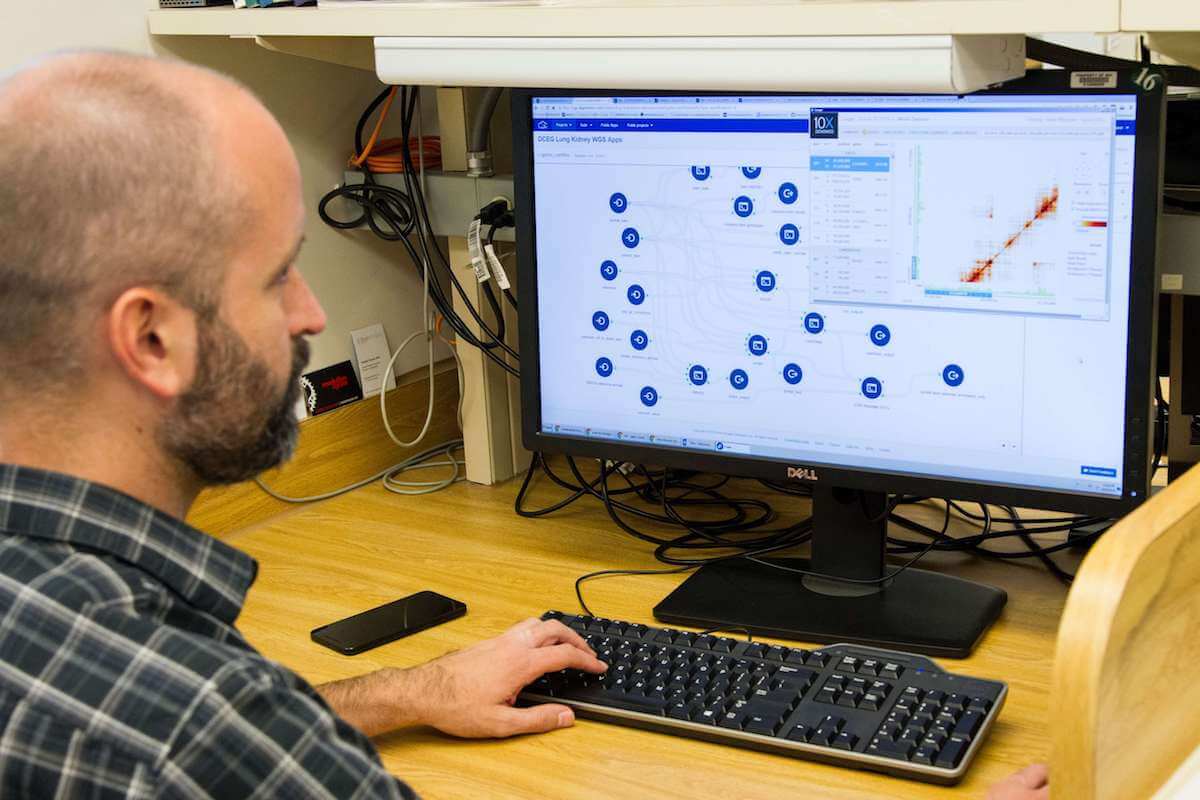In 2020, humans produced 2.5 quintillion bytes of data every day, a number that is predicted to expand to 463 exabytes daily by 2025. The amount of data within the life sciences alone is so large and complex that scientists can barely keep up, presenting a unique opportunity for companies within this industry. According to Deloitte, organizations that are able to make sense of this data and use it to develop breakthrough technologies will see the greatest rewards.
Through bioinformatics, biologists can make sense of the massive amounts of data created each day, leading to discoveries that help us better understand our world.
What is Bioinformatics?
Bioinformatics combines computer programming, big data, and biology to help scientists understand and identify patterns in biological data. It is particularly useful in studying genomes and DNA sequencing, as it allows scientists to organize large amounts of data.
“The goal of bioinformatics is to leverage all of the new technologies that we have—which would include advances in computational capacities, new graphics cards, new algorithms—and applying that to big data generated from biological systems to answer questions previously not answerable,” says Stefan Kaluziak, an assistant professor of bioinformatics at Northeastern University.
For example, bioinformatics has helped lead to the sequencing revolution that has preoccupied biologists for the last decade. Through new advancements in the field, scientists have gained access to the genomes of hundreds of organisms, providing a deeper understanding of how genetic material behaves across species.
Advance Your Career with a Master’s in Bioinformatics
Be at the forefront of an industry that’s changing lives.
The Importance of Bioinformatics
Thanks to the exponential amount of data created in recent years, bioinformatics will play a critical role in future scientific discoveries.
“Leveraging those algorithms and advances in machine learning and applying that to the tremendous amount of data that we’ve generated in the last 10 years is probably going to be the next frontier in bioinformatics,” Kaluziak says.
To fully understand that data, however, it’s important to have a foundation in biological knowledge, making the field of bioinformatics and its multidisciplinary focus particularly important.
While a skilled data scientist will be able to develop an algorithm and generate results from a set of data, their ability to accurately interpret and apply those data can make all the difference.
“If they don’t understand the genomic data, the results are meaningless to them,” Kaluziak says. “You have to be able to interpret the results and see if your algorithm is failing or needs adjustment.”
Careers in Bioinformatics
The field of bioinformatics is growing steadily, with the Bureau of Labor Statistics predicting a 15 percent increase in computer-based analysis jobs by 2029. Ongoing research and development in healthcare, pharmaceuticals, and biotechnology are largely responsible for this growth: Between 2018 and 2019 alone, research and development spending in the life sciences industry rose by 22 percent, pointing to increased demand for innovative solutions across the industry.
Careers within bioinformatics vary, and many professionals within the industry will find themselves using bioinformatics at some point during their research. Those who pursue specialized careers as bioinformaticians can expect an average annual salary of more than $75,000, according to Glassdoor. In this role, professionals can expect to write code, analyze data, meet with fellow researchers to understand projects, and write reports on their findings.
Essential Skills for Bioinformaticians
“You have to know a lot of things that aren’t traditionally grouped together,” says Kaluziak of the skills a successful bioinformatician should have. These topics range from biology and statistical analysis to programming and machine learning and also include the following:
- Storing and managing large datasets
- Cluster analysis
- RNA, DNA, and protein sequencing analysis
- Developing algorithms
- Familiarity with Linux, especially for managing clusters of servers
- Various programming languages, including Python, R, and Perl
- Overseeing lab information management systems
- Creating data visualizations for use in reports
- Image analysis
- Developing monitoring processes
In addition to these technical skills, critical thinking and adaptability are among the most important soft skills.
“One of the hardest things to teach students is to think critically and solve problems,” Kaluziak says. “They need to know how to approach a problem and deconstruct it into its subcomponents, then stitch it together to get the answer.”
Given the speed at which bioinformatics and technology change, successful bioinformaticians must keep up with developments in the industry. Becoming more adaptable and learning how to quickly understand new resources can help in this sometimes overwhelming task.
“The vast majority of the things I was taught when I started my education are completely irrelevant now,” Kaluziak says. “The field changes way faster than most others.”
Earning Your Master’s in Bioinformatics
Pursuing your master’s degree in bioinformatics can give you the technical skills you need while helping you develop the critical thinking and adaptability needed for success. Whether you have experience primarily in biology or computers or are choosing an entirely new career path, Northeastern’s program is designed to provide a comprehensive understanding of both.
Learn More | What Can You Do with a Master’s in Bioinformatics?
Students in the program use real-world data on a regular basis, managing and conducting analysis on large data sets and drawing their own conclusions from the results.
“We’re giving students data and saying, ‘Here, do something with it,’” Kaluziak says. “It might be good, it might not. The hard part is figuring out if it’s even usable, and if it is usable, what does it mean?
Students can also take advantage of the university’s co-op program, allowing them to gain up to six months of full-time work experience before graduating.
Learn more about Northeastern’s master’s in bioinformatics here.






Related Articles
Compliance Specialists: Who They Are and What They Earn
Science or Science Fiction? The Future of Personalized Medicine
In-Demand Biotechnology Careers Shaping Our Future